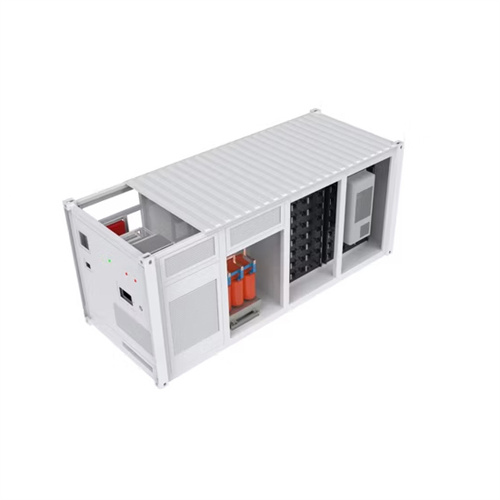Photovoltaic panel grade identification

Integrated Approach for Dust Identification and Deep
The accumulation of dust on photovoltaic (PV) panels faces significant challenges to the efficiency and performance of solar energy systems. In this research, we propose an integrated approach

Solar Panel Identification Via Deep Semi-Supervised Learning
As residential photovoltaic (PV) system installations continue to increase rapidly, utilities need to identify the locations of these new components to manage the unconventional

Diagnosis and Classification of Photovoltaic Panel Defects Based
A change in the operating conditions of the PV array indicates implicitly that a fault has occurred. This fault can be divided into three categories []: physical faults can be a

Parameter identification of the photovoltaic panel''s two-diode model
PDF | This work deals with the two-diode model of a photovoltaic (PV) panel. It provides the per-unit energy and current representations in addition to... | Find, read and cite all the research

Parameter Identification of Solar Photovoltaic Systems
Solar photovoltaic system parameter identification is crucial for effective performance management, design, and modeling of solar panel systems. This work presents the Subtraction-Average-Based Algorithm (SABA), a

Physical Separation and Beneficiation of End-of-Life Photovoltaic Panel
One of the technical challenges with the recovery of valuable materials from end-of-life (EOL) photovoltaic (PV) modules for recycling is the liberation and separation of the

Types of Solar Panels
Made from polycrystalline cells (also known as polysilicon (p-Si) and multi-crystalline silicon (mc-Si), these panels are the most common and the cheapest type of solar panels. Key Factors: The process used to produce polycrystalline

Why Do Consumers Choose Photovoltaic Panels?
The results of structural equation modeling showed that only functional value and environmental value had a positive impact on consumers'' choice behavior toward photovoltaic panels. Photovoltaic

Solar Panel Ratings Explained
The Wattage rating of a solar panel is the most fundamental rating, representing the maximum power output of the solar panel under ideal conditions. You''ll often see it referred to as "Rated Power", "Maximum Power",

Why Do Consumers Choose Photovoltaic Panels? Identification
Why Do Consumers Choose Photovoltaic Panels? Identification of the Factors Influencing Consumers'' Choice Behavior regarding Photovoltaic Panel Installations. solar photovoltaic

How To Judge The Grade Of Solar Panels? –
Judge the grade of solar panel from the following points: 1. Look at the surface. Carefully check the tempered glass surface. The glass surface of solar panels with poor quality is relatively rough, and the residual silica gel on

Comprehensive Guide to Solar Panel Types
This results in a directional current, which is then harnessed into usable power. The entire process is called the photovoltaic effect, which is why solar panels are also known as photovoltaic panels or PV panels. A typical solar panel contains

6 FAQs about [Photovoltaic panel grade identification]
What is a Grade A solar panel?
Understanding the Solar Panel Grades of Cells Grade A solar cells are easily the most sought-after for their premium quality. They are devoid of any chips, cracks, and scratches, which helps them convert solar energy into electricity at their best efficiency.
How do I determine the grade of a solar panel?
Assessing the grade of a solar panel is a crucial step in ensuring you invest in a system that meets your energy needs and quality expectations. Here, we explore the two key factors to consider when determining the grade of solar panels: visual inspection and purchase channels.
What is a Grade B solar panel?
Grade B solar panels have visual defects but meet performance specifications. These solar panels are less common than grade A solar panels but are typically available from manufacturers upon request. Most manufacturers keep these panels for testing purposes but sell them with warranties like grade A solar panels.
What are Grade C and grade D solar panels?
Grade C and Grade D panels occupy a niche in the solar panel spectrum, and their use is relatively rare: Grade C Panels: These panels often have severe cosmetic flaws or are made from cells with visible damage. They are typically unsuitable for standard solar installations.
What does a Grade C solar panel mean?
Grade C should be quite obvious and would also mean the power of your panel is below the rating.. J.T. What would be the typical price difference between a Grade A and a Grade B solar cell? The price difference between Grade A and Grade B solar cells can easily be USD 0.05 - 0.10/W..
Are Grade C solar panels worth it?
Grade C solar panels have visual and performance defects, causing them to fall far behind in desirability. Grade C solar panels usually sold overseas at far lower prices in third-world countries. Buying these solar panels is not worth it as they break down much faster and don’t make nearly as much power as grade As and Bs.
Related Contents
- What does qb mean for photovoltaic panel component grade
- Identification of Broken Photovoltaic Panel Glass
- Photovoltaic panel contamination identification standards
- Photovoltaic panel quality identification chart
- Photovoltaic panel structure Slovenia
- Photovoltaic solar panel price U S Outlying Islands
- Photovoltaic panel system Guyana
- Tanglang Township Photovoltaic Panel Installation Manufacturer
- Distributed photovoltaic panel routing diagram
- Solar Photovoltaic Panel Hole Transfer Machine
- Photovoltaic panel connection line process drawing
- Photovoltaic panel installation spacing specifications